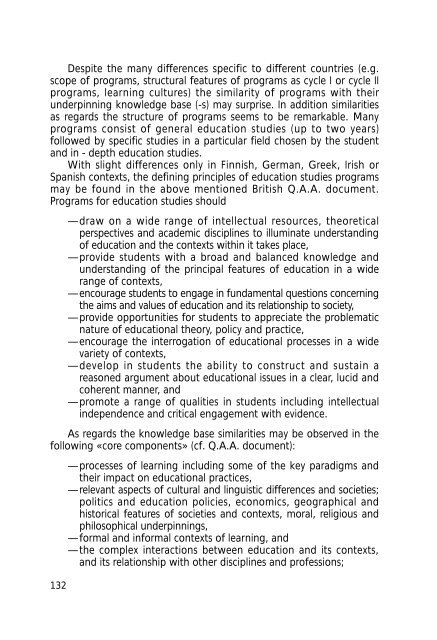Final Report Pilot Project - Relaciones Internacionales de la ...
Final Report Pilot Project - Relaciones Internacionales de la ...
Final Report Pilot Project - Relaciones Internacionales de la ...
Create successful ePaper yourself
Turn your PDF publications into a flip-book with our unique Google optimized e-Paper software.
Despite the many differences specific to different countries (e.g.<br />
scope of programs, structural features of programs as cycle I or cycle II<br />
programs, learning cultures) the simi<strong>la</strong>rity of programs with their<br />
un<strong>de</strong>rpinning knowledge base (-s) may surprise. In addition simi<strong>la</strong>rities<br />
as regards the structure of programs seems to be remarkable. Many<br />
programs consist of general education studies (up to two years)<br />
followed by specific studies in a particu<strong>la</strong>r field chosen by the stu<strong>de</strong>nt<br />
and in - <strong>de</strong>pth education studies.<br />
With slight differences only in Finnish, German, Greek, Irish or<br />
Spanish contexts, the <strong>de</strong>fining principles of education studies programs<br />
may be found in the above mentioned British Q.A.A. document.<br />
Programs for education studies should<br />
—draw on a wi<strong>de</strong> range of intellectual resources, theoretical<br />
perspectives and aca<strong>de</strong>mic disciplines to illuminate un<strong>de</strong>rstanding<br />
of education and the contexts within it takes p<strong>la</strong>ce,<br />
—provi<strong>de</strong> stu<strong>de</strong>nts with a broad and ba<strong>la</strong>nced knowledge and<br />
un<strong>de</strong>rstanding of the principal features of education in a wi<strong>de</strong><br />
range of contexts,<br />
—encourage stu<strong>de</strong>nts to engage in fundamental questions concerning<br />
the aims and values of education and its re<strong>la</strong>tionship to society,<br />
—provi<strong>de</strong> opportunities for stu<strong>de</strong>nts to appreciate the problematic<br />
nature of educational theory, policy and practice,<br />
—encourage the interrogation of educational processes in a wi<strong>de</strong><br />
variety of contexts,<br />
—<strong>de</strong>velop in stu<strong>de</strong>nts the ability to construct and sustain a<br />
reasoned argument about educational issues in a clear, lucid and<br />
coherent manner, and<br />
—promote a range of qualities in stu<strong>de</strong>nts including intellectual<br />
in<strong>de</strong>pen<strong>de</strong>nce and critical engagement with evi<strong>de</strong>nce.<br />
As regards the knowledge base simi<strong>la</strong>rities may be observed in the<br />
following «core components» (cf. Q.A.A. document):<br />
132<br />
—processes of learning including some of the key paradigms and<br />
their impact on educational practices,<br />
—relevant aspects of cultural and linguistic differences and societies;<br />
politics and education policies, economics, geographical and<br />
historical features of societies and contexts, moral, religious and<br />
philosophical un<strong>de</strong>rpinnings,<br />
—formal and informal contexts of learning, and<br />
—the complex interactions between education and its contexts,<br />
and its re<strong>la</strong>tionship with other disciplines and professions;


